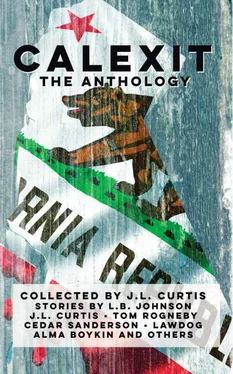As she pulls off the road, replacing the decoy brush and debris that guards John’s trail, she hears the sound of a vehicle.
Turning off the engine, she crouches down, just enough light now to see the road, but not so much that she would be seen here deep in the trees. It’s a large flatbed truck. On the back are barricades, lots of them, headed east.
They glide by, thankfully not seeing her, probably half asleep themselves. But she realizes the reason for the barriers. They’re blocking the roads that lead eventually into Nevada, not just the main ones. That explains the lack of cars and the one bicyclist she thought she saw. You can’t really build a “Wall” in the mountains in what is left of California, but if you block the roads, 99% of the populace will not get through, the trek being too long over rough terrain for a hiker.
When all is quiet, she waits another fifteen minutes and the fires the truck up and heads up the hill to John’s barn. He greets her with a silent wave and draws her into the house.
“You need to stay here until dark,” he said. “I heard the vehicles, it won’t be safe to go back home until tonight after they have set things up and gone back to the Valley.”
She agrees, knowing Taxi is safe in the barn with enough food and water for a day or two. She doesn’t risk leaving him in the meadow when she is gone due to the dangers from mountain lions.
She enjoyed John’s company, if only for a few hours. She’s in her own little world right now, this limbo between the Calis to her west and the lure of freedom, or death if she heads to the east. She’s the swing of the hammer, the trajectory of the bullet, the frame of a window. Most days she works until long after dark, tossing the moon back like a shot of scotch, stopping only to get a small clean glass from the cupboard, last call.
Certainly, it’s easier to let others do the work, to just sit back and wait for help, wait for that handout, and wait for that check you did not work to earn. But she can look in the mirror and see the space and the solitude and its rewards, the broken nails and occasional scrape a sign of progress. It’s the only way she can live, the entitlement mindset, to her, being like that of an animal, drawn to a baited trap from a wide-open field, the instincts that would recognize a trap now dulled, not even comprehending it is doomed, and no longer afraid, for it was no longer free.
If you rely solely on others to feed you, to protect you and to sustain you, to prop you up and pat you on the back when you fail, you’ve not just made them your judge you’ve made them your jailer. Even worse, it’s a jail term without end, for it’s done with the sanction of your own conscious.
When darkness fell, her neighbor John insisted that he ride shotgun with her the mile home to her place. He said he could hike back. She didn’t ask him where he got the AR15 with the holographic scope, but with him being a former Marine, she knew he could use it.
They made it back without seeing anyone, and he helped her get the hay in the barn before she sent him home with some frozen venison stew and a hug. She was once again glad she had not bought a house on the main highway that crosses the hills to her north. It is likely the only reason she had not been discovered.
She runs her bath by candlelight, in the near darkness inside her home. Even though there is not an occupied house, other than John’s, for miles she doesn’t want the light of her place visible from any distance. Her well is still supplying water, as she prays for a good snowfall this winter to build up the water supply. Drought is what she fears most, not simply because of the supply of well water but because of the fire danger. She has lived here long enough to see flames from the forest licking the forest only 10 miles away. She fled as the C130’s began their runs overhead. Now, if there is a fire, there will be no planes. She’s not seen a plane of any kind fly over in months, though one night, in total darkness, she swore she heard the sound of a very small plane struggling in the thin air above heading east in the blackness, someone risking controlled flight in the darkness to escape the life in Cali as it exists today.
She opens the wrapper of one her few remaining bars of soap, the brand her mother used, and the smell is as she always remembered. It’s like the smell of Crayons. Not what she’d call a pretty smell, but such a familiar and a comforting one. That brand of soap was all they ever had as a child, that and the thick, gritty powdered soap for washing hands after shop and yard work. This plain white bar is what she had washed her face with for most of her life. But she can also well remember how it tastes, for once when she said a cuss word, her mom washed out her mouth with it. It did NOT taste good.
As she finishes her bath, carefully drying her hair and checking her robe for the small handgun that resided there in the pocket, she thought a lot about that world she grew up in, and the one outside of her window now. You can say all you want about what youth of her generation are exposed to, violent video games, bloodshed, sex and violence on TV. But she truly believed that as children, the moral imperatives that initially form in us are in response to parenting, not society or entertainment. That’s probably why her mom home-schooled her, back when it was still legal. That was why Lisa knew that there would be dire consequences if she tried to drop an anvil on her cousin’s head or blew up the garage with Acme Dynamite like Wile E. Coyote tried to do to the Roadrunner every Saturday morning.
She realized she was just a child back then, but she knew something that those that threaten her now don’t — that there is a moral code to this world and that the world as well, did not revolve around our every need and happiness. It was how her parents were raised, and how she was raised. Her parents clothed her, loved her, praised her, and punished her, not without thought and not with an unwarranted decree, but in a manner firm enough it definitely got her attention.
She tested those boundaries when she was a child, because that’s what children do, finding that with those boundaries came accountability. One soon learns that a tantrum in Safeway will not get you that toy by the check stand; it will get you a quick and silent removal to the car and home to think about it in your room, without any toys. One learns that if one lies to a parent, that certain things we enjoy are not a right, they’re earned by responsibility. One learns that if one tries to jump off the garage roof with a makeshift airfoil, the ground will smite thee only a little less than Dad will. One often, much later, learns that if you carelessly play with what one holds dear, there are consequences for more than just yourself, lessons that stay long after the aftermath.
Now, she thought, most kids are given access to most anything good and bad that the TV and the Internet have to offer, at the earliest of ages, not as a lesson in choice, but as a way of entertainment for parents often absent. Through expectation or demand, children are given possessions so freely that neither the object nor the givers have value to them, and, if acting out in their attempts to cajole or control, their actions are forgiven before forgiveness had been even ventured or earned.
As an only child, she was not insulated from the world and its capabilities for harm. She understood the rudimentary principles of physics, ballistics, and stupidity. Current events were discussed, war, poverty, and mans’ evil against other men, but only when old enough to grasp and apply those lessons. She had been given books that would be banned today for being politically incorrect. She had toys that could cause second-degree burns. She had chemistry sets that could actually blow things up. She learned how to safely handle certain firearms and respect the trust of their use, their purpose, which was not to impose our will or to take something we had not earned, but to provide and protect.
Читать дальше










